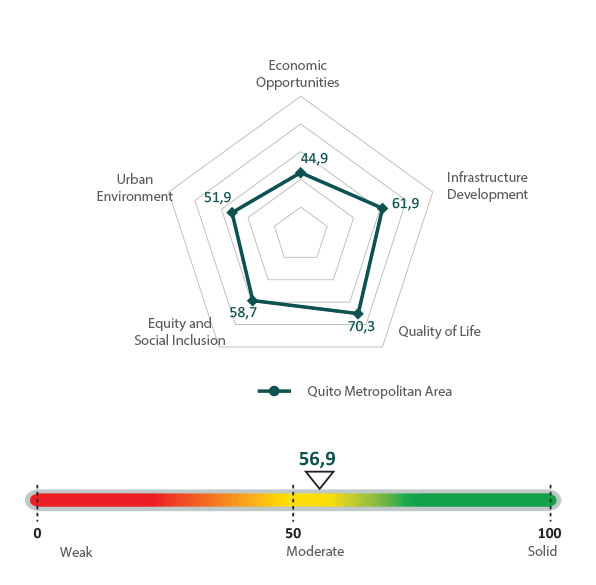
According to a reading of the levels of territorial prosperity in the Metropolitan District of Quito, they are at a moderate weak value according to the Urban Prosperity Index (CPI), with a score of 56.9 points out of 100. These results show that among the main strengths are the coverage of systems and infrastructure that support quality of life and habitability conditions, particularly accessibility to public space and educational facilities, as well as the general coverage of essential public services. The other dimensions show moderate to weak values, indicating the need to strengthen and prioritize urban policies on employment, environment, mobility, among others.
* These indicators include: life expectancy at birth, under-five mortality rate, vaccination coverage, maternal mortality, literacy rate, average years of schooling (disaggregated between males and females), attendance of children under 6 years of age in early childhood development programs, net higher education rate.

The results of these indicators show that one of the main challenges to prosperity is the equitable distribution of social support equipment, with special emphasis on cultural (museums, libraries, among others) and health facilities. This condition is added to the low levels of fixed internet access by households, which compromises their ability to access information, educational opportunities, employment and cultural expressions. Finally, there is a need to improve the conditions of the road network to increase connectivity in the urban area, improve mobility conditions and provide safe operating conditions for alternative livelihoods.
Results of infrastructure measurement for development: 66 / 100
The results of these indicators indicate that among the main challenges for territorial prosperity are improving health conditions for pregnant mothers, strengthening the education system and improving security conditions and citizen coexistence.
Results of quality of life measurement: 70.3 / 100


The results of these indicators show that one of the main challenges for prosperity is the treatment of solid waste (recycling) and liquid waste (wastewater treatment). Likewise, the need to strengthen the air quality monitoring system that allows, among other things, to control and reduce emissions of polluting materials into the atmosphere. Finally, it is essential to prioritize policies to increase the extension of protected areas over the watersheds that supply water to the city.
Results of urban environment measurement: 51.9 / 100
The results of these indicators show that one of the main challenges for territorial prosperity is to prioritize urban policies that favor the development of diverse jobs that generate added value for the city and, at the same time, integrate the young population and allow households to improve their income conditions.
Results of economic opportunities measurement:
The results of these indicators show that one of the main challenges for territorial prosperity is to prioritize urban policies that favor the development of diverse jobs that generate added value for the city and, at the same time, integrate the young population and allow households to improve their income conditions.
Results of economic opportunities measurement: 44.9 / 100


The results of these indicators show that one of the main challenges for territorial prosperity is social inclusion, considering that the figures for youth unemployment and the Gini coefficient evidence social gaps and inequality in the city. Likewise, it can be said that these conditions are manifested geographically, since there is no great diversity in land use (mainly in peripheral areas) that imply easy access to employment, services or commerce.
Results of social equity measurement: 58.7 / 100
The results of these indicators indicate that, among the main challenges for territorial prosperity and the promotion of inclusion from this pillar, are the high levels of perception of corruption by citizens and low levels of community participation and articulation in the territory. It should be noted that during this analysis, information gaps in terms of governance and institutional capacity, an essential condition for promoting participatory, open and transparent governance, have become evident. Additionally, the number of days to start a business (48.5) gives a weak rating to the regulatory capacity subdimension.
Inclusive governance measurement results: 49.7 /100
